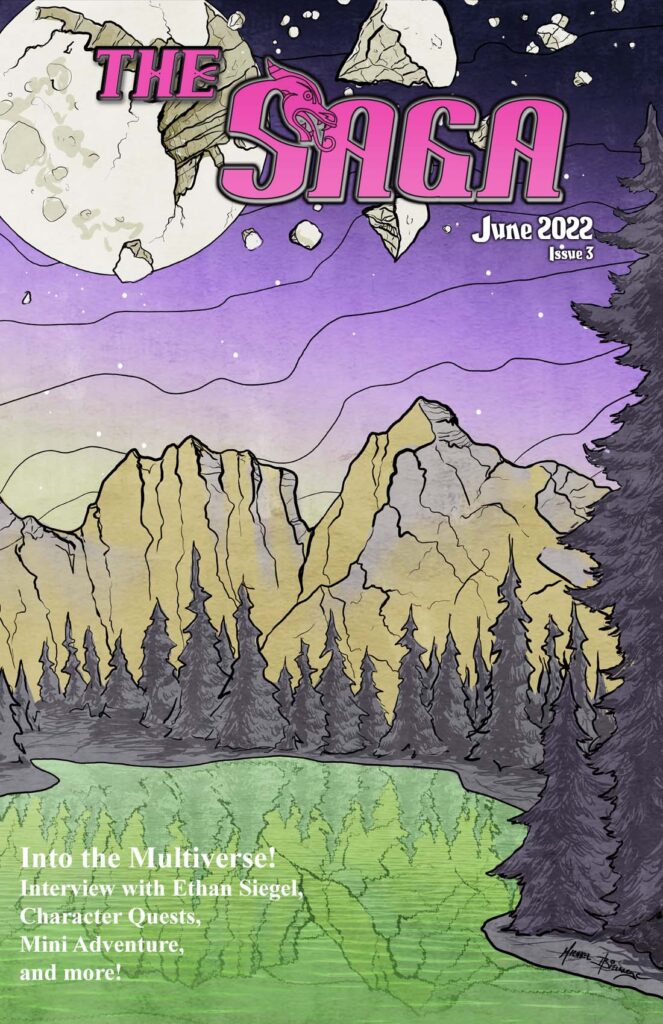How do we tell stories in a multiverse? There are a couple of ways that immediately come to mind, depending on what your goals are. One of the biggest things to keep in mind is what you’re doing with your multiverse, that will help shape the process you use. Each reality in a multiverse is effectively its own setting and can be thought of in that way for constructing it. The general rule I would use is that the more specific the purpose for dabbling in the multiverse, the more specific your details need to be.
When we start moving forward with creating multiverses we need to figure out what links them together, why they’re being explored. A lot of this article presumes characters are traveling between universes as part of some sort of quest. Consider how the realities are linked. Are they tied together by different versions of the characters? Are they tied together by theme? Are they pretty much the same worlds, except where something back in history was changed? Before planning out each universe (well, let’s be honest, we all probably start these projects because we have a couple we want to explore or show off!) make some notes about the common threads that tie them together. This will help you stay a bit more focused and will hopefully allow you to create a tighter knit story.
A Multiverse in a Story
If you’re writing a story you’ll need to be the most specific about the details you put into creation of your multiverse. What you need for your characters to do, or ways the new setting will change the characters’ experiences will determine the changes from the base universe. Since you’ll work out exactly what’s going on through the process of writing your story you’ll be able to figure out exactly what needs to change to make each new reality compelling and help push the plot forward. This sort of thing is like using a scalpel, it’s incredibly precise, so even though it’s possibly the most detailed when it comes to specifics, it’s the most focused, which will hopefully balance out the workload. While you need to have a rough idea of how things work in a macro sense you don’t need it to present it all to the readers.
A Multiverse in an Adventure
If you’re writing an adventure for an RPG you must pull the view back a bit. You need some of the detail of the story, with more of the worldbuilding of a setting. In some ways I think this is the hardest as you must be ready for your players to come out of nowhere with ideas and directions they want to move to complete the adventure or campaign. Keeping good notes on each reality the adventure may take the characters, with some specifically giving you ideas of the feel for each. The longer you expect the characters to stay in a universe, or the more important the actions the characters will take there, the more prepared you should be for things going off the rails.
When creating a setting, particularly one that is a sandbox for other people to play in, you need to think of larger details. Rather than figuring out the name of everyone a character in a story will meet, you need to have an idea of how things work in general. Knowing the political situation, and what types of encounters might be had, are going to be of more use to someone running a game than the back stories of everyone in the slums one of the player characters grew up in. While it’s great to give some details, at this level they typically are going to represent important, unique figures, or as examples of the types of people they might encounter in this universe.
I kept talking about “feel” in this article. One of the things that a lot of storytellers have learned is that if you get some big details right, and you absolutely nail the feel of the project, your audience will forgive a lot. For those of us that are pretty cerebral, we like to have everything figured out, and that possibility of analysis paralysis can absolutely kill a project before it has a chance to get into the world. Multiverses can be even more mind bending for most people. Like many things, taking things a step at a time, and keeping the goal of your project in focus will help a lot. At some point though, we all just have to call something good and put it to the test. Happy universe hopping!

